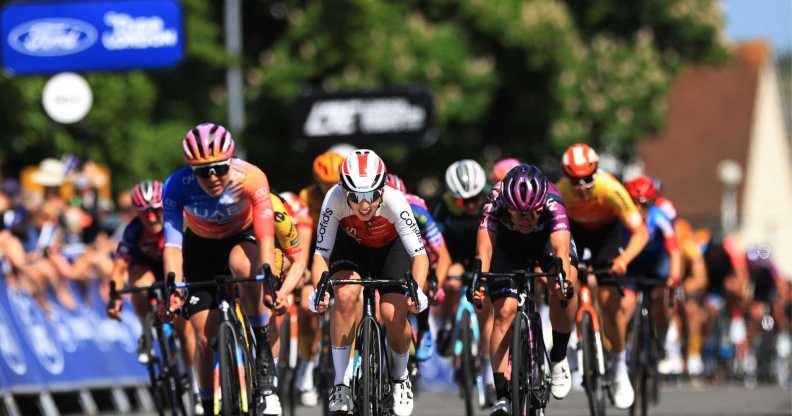British Cycling’s new ‘open’ category will put trans athletes at ‘major disadvantage’, says former racer

A former racer has slammed British Cycling’s decision to ban trans women from competing in the women’s category. (Stephen Pond/Getty Images)
A former racer has slammed British Cycling’s decision to ban trans women from competing in the women’s category, saying she is “perplexed” and “disappointed” by the new policy.
On Friday (26 May), the national cycling body announced that trans women, trans men and non-binary individuals must now compete in its new ‘open’ competitive category.
British Cycling suspended its trans and non-binary participation policy last April while it undertook a review of scientific research and consulted with members. It has become one of a number of sporting bodies moving to exclude trans people from participating in sporting competitions in categories that align with their gender identity.
Under the cycling body’s new policy, the ‘female’ category excludes trans women, only allowing participants “whose sex was assigned female at birth”. It welcomes trans men who have not yet begun hormone therapy.
The changes only apply to competitive activity and don’t include non-competitive programmes, like the Breeze rides – a community initiative for women that will still remain open to trans women and non-binary individuals.
Former racer and cycling retailer Jackie Aspden, who takes part in the Breeze rides, has described British Cycling’s new policy as “patently designed” to ensure trans women compete at a “major disadvantage”.
Aspden, 78, told road.cc: “I have just read the proposal and am perplexed. I understand the worries of women athletes and accept the present situation there until better research into the effects of hormone treatment is done.
“However, the inclusion of men into the ‘open’ category is patently designed to make sure that transgender women will compete at a major disadvantage, especially if like myself their testosterone levels are virtually zero.
“In my case, my upper body strength has reduced to the extent that I cannot manage to throw darts effectively. I can ride on my road bike but average speeds are limited to around 11.5mph. Admittedly, I am almost 79 years old and that has some effect, so I tend to limit rides to a maximum of 60 miles and need to maintain fuel levels to do so.
“I ride and lead rides with Lancaster Women’s Cycling Group as well as being an administrator. I stopped riding British Cycling social rides after a very uncomfortable event on the outskirts of Liverpool. That was the only time I have experienced transphobia.
“I’m very disappointed [in the policy updates] and certainly will be very unlikely to rejoin British Cycling.”
Aspden’s words were echoed by former professional cyclist Philippa York, who competed at the highest level in Europe for 16 years and regularly contributes to Cycling News.
York described the decision to ban trans women from the Team GB cycling selection – even if they meet the world governing body for sports cycling, Union Cycliste Internationale, standards – as “sport’s trans shame exposed”.
“Can trans women who meet the UCI’s eligibility criteria compete in the female category for the GB Cycling Team ?….No,” York wrote on Twitter on Saturday (27 May).
“The new British Cycling Policy for Competitive Activity will apply to all selections for the GB Cycling Team’ … Sport’s trans shame exposed.”
British Cycling CEO Jon Dutton said in a press release that the body’s new policies reflect a “robust nine-month review process” and he is “confident” that the policies both “safeguard the fairness of cyclesport competition” and ensure all riders have “opportunities to participate”.
The nine-month policy review was led by an internal working group, made up of people from British Cycling, Scottish Cycling and Welsh Cycling. It also included targeted consultations with 14 focus groups and a number of one-on-one interviews with cis, trans and non-binary cyclists.
How did this story make you feel?

